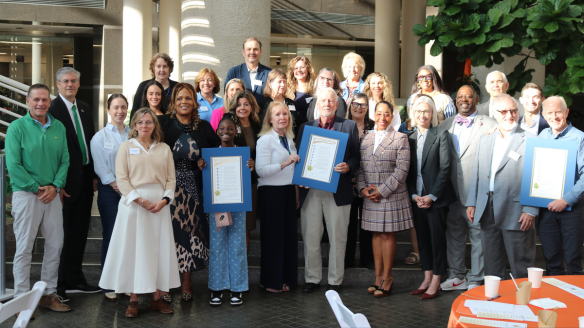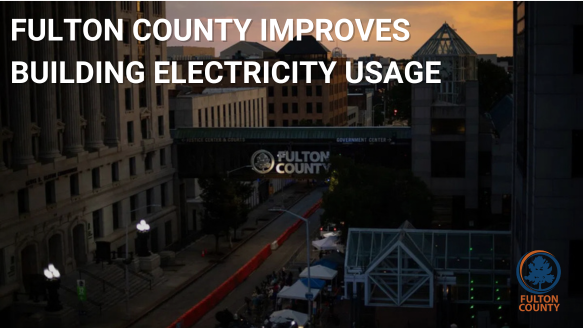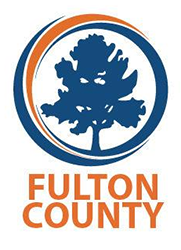Sustainability
Sustainability & resilience
Welcome to Fulton County’s Sustainability and Resilience homepage. On this page, you will find information about the county’s Sustainability and Resilience Plan and related news, initiatives, and resources for the community.
The Fulton County Citizens Commission on the Environment (FCCCE) has closed its nomination applications for the 2025 Environmental Award. The FCCCE will host an awards ceremony recognizing the environmental accomplishments in each district. This year the ceremony will be held on Wednesday, October 15, at 8:30 a.m.
sustainability & resilience initiatives
sustainability & resilience featured news article

Fulton County Presents Seven Environmental Honors

Public EV chargers to go live at two Fulton County sites
Happening in Fulton: Fulton County Powers Ahead with Solar Panel Expansion

Public Hearings set for EV Chargers at Fulton County Buildings
Happening in Fulton: Fulton County Launches Major Solar Energy Initiative

Fulton County Government and Justice Centers Improvements Reduce Electricity Consumption by 17 Percent

Fulton County Commissioners Honor 2024 Environmental Award Winners
Sustainability & Resilience Resources for Residents and Businesses
Federal Clean Energy Tax Credits
The federal government may offer tax credits for home efficiency upgrades. Check for availability.
Georgia Environmental Finance Authority Home Energy Rebates
Funding is available for home energy assessments and energy efficient appliances. Income level may affect rebate amount.
North Georgia Water Planning District Water Efficiency Rebates
Efficient toilet rebates are available for single family homes built before 1994. Rebates are also available for smart leak detectors, which can notify you of possible leaks and even shut off your water. Eligibility is based on your water utility.
Atlanta High Energy Burden WeatheRISE Program
Energy efficiency and healthy home upgrades for owner-occupied single-family homes in high energy-burdened neighborhoods. (Atlanta residents only.)
Georgia Power Home Energy Improvement Program
Funding is available for home energy assessments, heat pump water heaters, attic insulation, duct sealing, air sealing, smart thermostats, EV chargers, and LED Lighting. (Georgia Power customers only.)
Atlanta Gas Light Energy Efficiency Rebates
Rebates are available for the following high efficiency natural gas equipment replacements: furnaces, water heaters, condensing water heaters, and tankless water heaters. (Atlanta Gas Light customers only.)
Cobb EMC Energy Efficiency Incentive
After receiving a home energy audit, Cobb EMC residential customers can receive up to $500 for qualifying home energy improvements. Residential customers may also be eligible for an HVAC tune up rebate. (Cobb EMC customers only.)
GreyStone Power Energy Efficiency Rebates
GreyStone residential customers are eligible for electric vehicle (EV) charger rebates and rebates for converting water heaters or HVAC equipment from natural gas to electricity. Residential customers may also be eligible for free home energy audits. (GreyStone Power customers only.)
Sawnee EMC Rebates and Incentives
Sawnee EMC residential customers are eligible for the following equipment rebates: attic insulation, electric hybrid water heater, duct sealing, HVAC tune up, variable speed pool pump, smart thermostat, central cooling load management switch, smart thermostats, Level 2 EV chargers, existing home heat pumps, and existing home air conditioners. (Sawnee EMC customers only.)
City of Roswell Toilet Rebate Program
Efficient toilet rebates are available for City of Roswell homes built before 1994. (City of Roswell residents only.)
North Georgia Water Planning District Water Efficiency Rebates
Efficient toilet rebates are available for multi-family properties built before 1994. Rebates are also available for smart leak detectors, which can notify you of possible leaks and even shut off your water. Eligibility is based on your water utility.
Atlanta Commercial Property Assessed Clean Energy (PACE)
Finance clean energy improvements via special assessments added to property tax and/or solid waste bills. (Atlanta businesses only.)
Georgia Power Commercial Energy Efficiency Program
Rebates are available for existing buildings for lighting, HVAC, commercial appliances, pumps, water heaters, and custom projects. New construction rebates are available for lighting and custom projects. (Georgia Power customers only.)
Atlanta Gas Light Energy Efficiency Rebates
Rebates are available for the following high efficiency natural gas equipment replacements: furnaces, tankless water heaters, tank water heaters, and condensing boilers. (Atlanta Gas Light customers only.)
GreyStone Power Energy Audits
GreyStone commercial customers are eligible for free energy audits. (GreyStone customers only.)
Sawnee EMC Commercial Rebates
Sawnee EMC commercial customers are eligible for lighting upgrade and Level 3/DC fast charger rebates. (Sawnee EMC customers only.)
City of Roswell Toilet Rebate Program
Efficient toilet rebates are available for City of Roswell businesses built before 1994. (City of Roswell customers only.)
Georgia Environmental Finance Authority Weatherization Assistance Program
Households with income that is 200 percent or less than the federal poverty level are eligible for whole-house weatherization.
Georgia Home Energy Payment Assistance
The Georgia Department of Human Services offers heating bill payment assistance to eligible households.
Fulton County Low-Income Home Rehabilitation Program
Income-qualifying homeowners in Fulton County are eligible for assistance with the following repairs: electrical, HVAC, roof, plumbing, water heater, weatherization, accessibility, and health and safety issues.
Georgia Power Low-Income Energy Audits and Upgrades
Eligible households can get free home energy assessments and energy efficiency improvements (Georgia Power customers only.)
Atlanta-Fulton County Emergency Management Agency
Mitigate against, prepare for, respond to, and recover from natural or man-made disasters.
Resilience Fact Sheet
One-page fact sheet about climate threats and resilience tools for individuals in Fulton County.
Resilience Study
In-depth analysis of climate vulnerability and resilience tools in Fulton County.
Weather-Ready Homes Guide
This guide helps residents prepare their homes for flooding, extreme heat, and storms.
Weather-Ready One Pager
One-page flyer summarizing the information that is covered in the Weather-Ready Homes Guide
Drawdown Georgia
Data and resources about achieving net zero greenhouse gas emissions in Georgia.
Extreme Heat in Georgia
Flyer about ways to stay safe during extreme heat created by the Georgia Youth Environmental Coalition.
Georgia Emergency Management Ready Georgia Campaign
Learn about how to make a plan and build a kit for a disaster.
Georgia Recycling Coalition
Learn about recycling and composting in Georgia.
UGA Cooperative Extension
The UGA Cooperative Extension offers programs such as 4H, Master Gardeners, and school gardens.
Water Career Assistance
Georgia non-profit The Water Tower offers water workforce initiatives including recruitment, training, and job placement.
Department of Energy Savings Tips
Energy and cost-saving tips for homeowners, renters, and drivers.
ENERGY STAR Energy Efficiency Program
Information about saving energy and ENERGY STAR appliances.
WaterSense Water Savings Program
Information about saving water and WaterSense appliances.
Ready.gov Disaster Preparedness
How to prepare for flooding, thunderstorms, and hurricanes.
National Weather Service Safety Tips
Safety tips for cold, floods, heat, tornados, and more.
EPA Excess Food Opportunities Map
Interactive map with information about potential generators and recipients of excess food.


